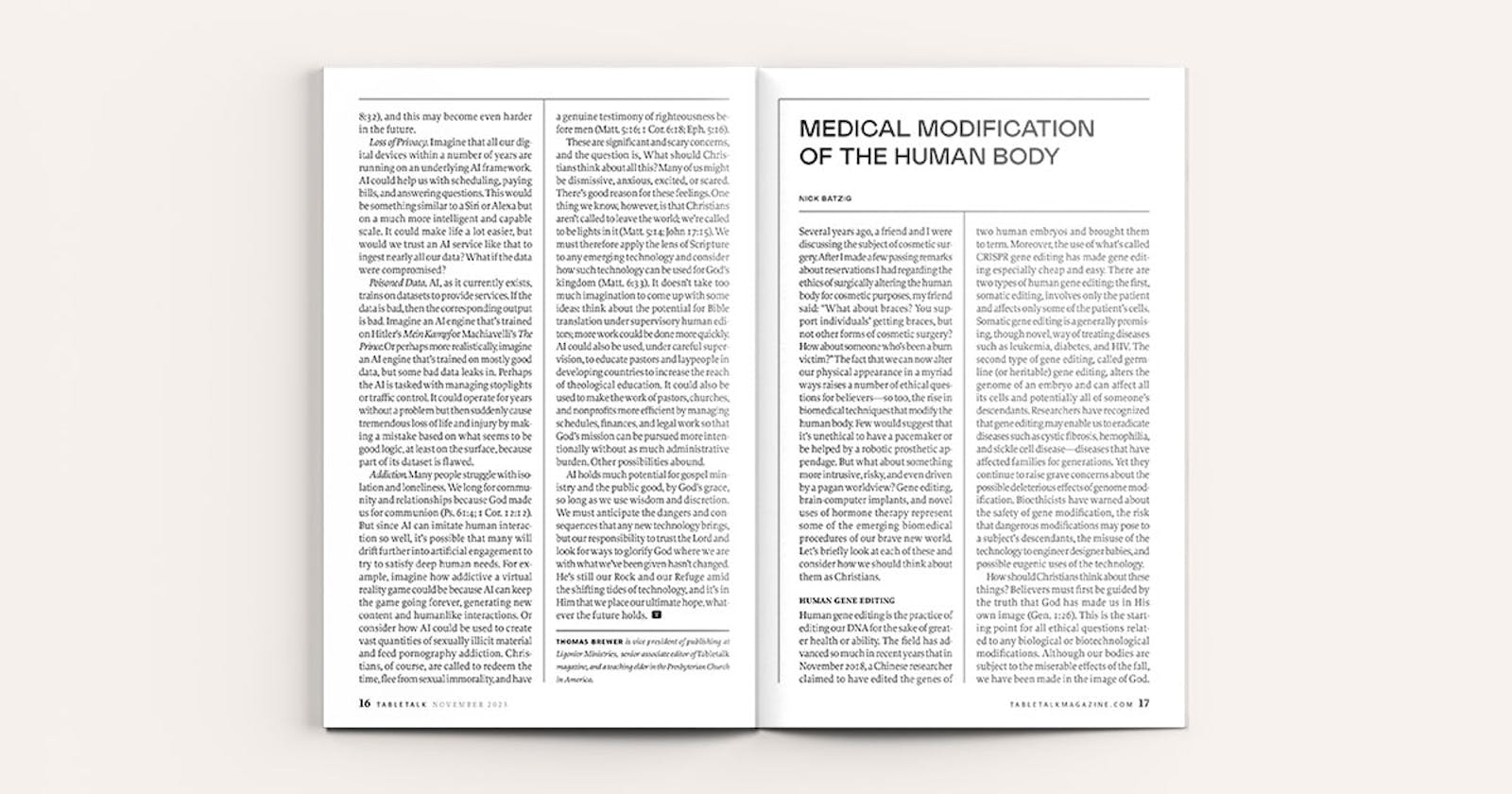
Request your free, three-month trial to Tabletalk magazine. You’ll receive the print issue monthly and gain immediate digital access to decades of archives. This trial is risk-free. No credit card required.
Try Tabletalk NowAlready receive Tabletalk magazine every month?
Verify your email address to gain unlimited access.
Several years ago, a friend and I were discussing the subject of cosmetic surgery. After I made a few passing remarks about reservations I had regarding the ethics of surgically altering the human body for cosmetic purposes, my friend said: “What about braces? You support individuals’ getting braces, but not other forms of cosmetic surgery? How about someone who’s been a burn victim?” The fact that we can now alter our physical appearance in a myriad ways raises a number of ethical questions for believers—so too, the rise in biomedical techniques that modify the human body. Few would suggest that it’s unethical to have a pacemaker or be helped by a robotic prosthetic appendage. But what about something more intrusive, risky, and even driven by a pagan worldview? Gene editing, brain-computer implants, and novel uses of hormone therapy represent some of the emerging biomedical procedures of our brave new world. Let’s briefly look at each of these and consider how we should think about them as Christians.
human gene editing
Human gene editing is the practice of editing our DNA for the sake of greater health or ability. The field has advanced so much in recent years that in November 2018, a Chinese researcher claimed to have edited the genes of two human embryos and brought them to term. Moreover, the use of what’s called CRISPR gene editing has made gene editing especially cheap and easy. There are two types of human gene editing: the first, somatic editing, involves only the patient and affects only some of the patient’s cells. Somatic gene editing is a generally promising, though novel, way of treating diseases such as leukemia, diabetes, and HIV. The second type of gene editing, called germline (or heritable) gene editing, alters the genome of an embryo and can affect all its cells and potentially all of someone’s descendants. Researchers have recognized that gene editing may enable us to eradicate diseases such as cystic fibrosis, hemophilia, and sickle cell disease—diseases that have affected families for generations. Yet they continue to raise grave concerns about the possible deleterious effects of genome modification. Bioethicists have warned about the safety of gene modification, the risk that dangerous modifications may pose to a subject’s descendants, the misuse of the technology to engineer designer babies, and possible eugenic uses of the technology.
How should Christians think about these things? Believers must first be guided by the truth that God has made us in His own image (Gen. 1:26). This is the starting point for all ethical questions related to any biological or biotechnological modifications. Although our bodies are subject to the miserable effects of the fall, we have been made in the image of God. Additionally, God has intricately made and fashioned each person (Pss. 33:15; 139:14). Accordingly, we must protect and preserve our lives and the lives of fellow image bearers.
Related to the doctrine of the imago Dei is the teaching of the sixth commandment. While the sixth commandment forbids the unlawful taking of a person’s life, it positively requires us to seek to promote and preserve the lives of others (see Westminster Larger Catechism 135). Somatic gene editing has shown much promise in preserving and helping human life, yet we must nevertheless approach it with caution, as we would any other major medical procedure. Germline gene editing, on the other hand, raises many ethical problems. Should humans interfere with life at its very conception? Does this not put man in the place of God? Does this sort of gene editing entail abortions of those children whose traits are not acceptable? Needless to say, Christians must either be very cautious about or outright reject various forms of gene editing, employing wisdom as new technologies emerge and develop, always viewing such developments in the context of a thoroughly biblical worldview.
brain-computer implants
In the 1980s, doctors began using a surgical therapy to treat certain aspects of Parkinson’s disease. The therapy involves implanting electrodes into the part of the brain that controls movement so that the brain can be electrically stimulated. Since then, brain implants have only continued to advance in their sophistication. Neuralink represents perhaps the most advanced attempt at connecting the human brain with more than just electrodes—Neuralink researchers seek to connect the brain with computer chips. Technology reporter Shiona McCallum highlights the potential benefits of a Neuralink implant: “Neuralink would be able to tackle complex neurological conditions which have so far proved beyond the capability of medical intervention. These range from paralysis and blindness to depression and schizophrenia.” Researchers have suggested that a Neuralink implant could, for example, enable someone with paralysis to operate a smartphone with his mind or perhaps send messages simply by thinking about them. This holds much promise for disabled individuals, but the question is how far the technology will go, and many have raised ethical concerns. For example, how can we know whether a person is thinking for himself or being controlled by a computer chip? What does this mean for personal responsibility? Could the implant erase memories? Would hackers be able to access personal data or even control a link to someone’s brain?

As Christians, we must remember that biotechnological advancements have been largely driven by secularism over the past century. Accordingly, there is an increasing rejection of the intrinsic value of man over animals and humans over computers. There is often an underlying “philosophical transhumanism” at work, the idea that humans and technology are destined to merge. Because Neuralink hasn’t been released yet, and perhaps never will be—human clinical trials were approved by the U.S. Food and Drug Administration as recently as May 2023—the question is how far the technology will go. Since the Lord has created us in His image (Gen. 1:27; 5:2; Ps. 139:13–16; Matt. 19:4), however, we know that we must be extremely cautious about or even outright reject brain-computer implants, such as Neuralink, that could go too far in modifying our thinking processes.
novel uses of hormone therapy
Hormone therapy involves treating our bodies with synthetic hormones for various purposes. Hormone therapy appears to present the fewest ethical problems, since it has had success in treating certain cancers and menopausal hormone imbalance for more than fifty years. In that sense, this technology isn’t new. A novel but increasingly common practice has appeared in recent years, though—using hormones to seek to transition genders. Christians must reject the practice of hormone therapy for this evil purpose. While we may make use of a myriad of medical treatments to help offset the miseries of life, it is not lawful to seek to alter our biological makeup to suppress the truth about who God has made us to be. God created man male and female, and we’re called to steward the bodies that God has given us, including whatever sex we are. Believers must therefore distinguish between biblically lawful uses of hormone therapy and the evil abuses of it.
A number of biotechnological possibilities are here or on the horizon. While God has given us the common-grace blessing of medical developments, Christians must exercise caution when considering procedures that will alter the biological configuration of the human body. Uncertainty about the risk involved in emerging procedures such as gene editing, Neuralink, and hormone therapy should lead Christians to a place of cautious and serious discernment about the acceptability of such practices. As we seek to make wise decisions, Christians must remember that God has made us in His image and that we are therefore not to harm our biological constitution.
